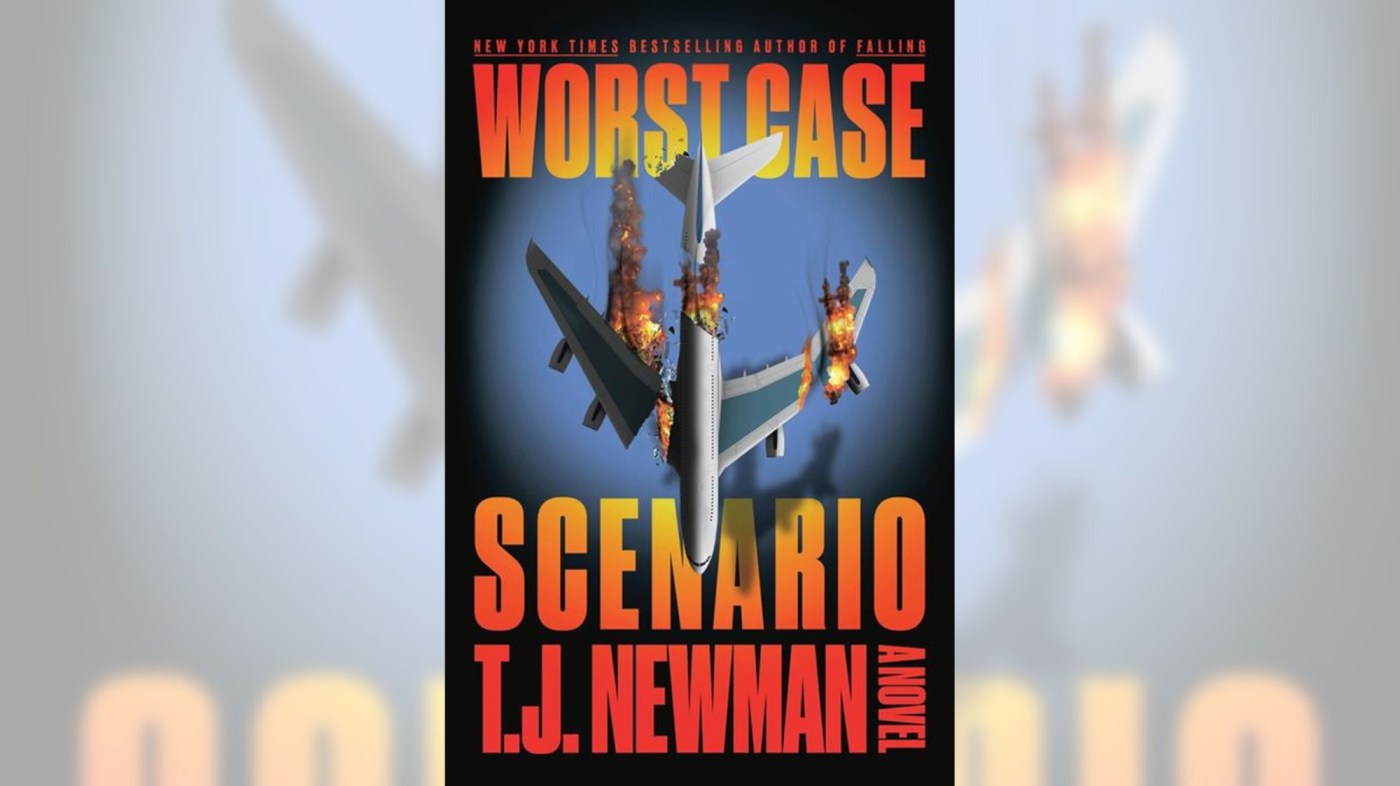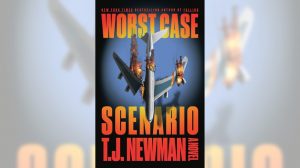
Author talked to pilots about a ‘Worst Case Scenario.’ It’s terrifying
While working as a flight attendant, T.J. Newman got the idea for her first thriller after asking pilots to describe the scary thoughts that kept them awake at night.
Her first book, “Falling,” which famously was partially written on cocktail napkins while working long-haul flights, is the story of a pilot faced with an impossible choice from terrorists: Either crash the jet or the pilot’s family will be murdered.
SEE ALSO: Sign up for our free Book Pages newsletter about bestsellers, authors and more
Her third thriller, “Worst Case Scenario,” which is out this month, was inspired by a pilot who told her his biggest fear was a commercial jet crashing into a nuclear power plant.
“It planted the seed,” Newman says from her Phoenix home as she packed for the red-eye flight that would launch her 17-day book tour. “I kind of tucked that away as a note to self: Circle back to that later.
“When I was thinking about what I wanted to write my third book about, I remember that interaction,” she says. “I started just Googling, doing some preliminary research just to see if there was anything there, if there was any validity to his fears.
“And it did not take long for me to realize there was a lot of validity to his fears,” Newman says. “The research terrified me, and it became very quickly apparent that what became the premise of the book is completely plausible.”
In “Worst Case Scenario,” a jumbo jet crashes into a nuclear plant near the small town of Waketa, Minnesota. It’s bad – all of nearly 300 people on board die on impact – but the reactors aren’t breeched so initially the plant seems to have survived the worst of it.
Then cracks and leaks are spotted in the pool where spent fuel rods are stored, and suddenly the entire Mississippi Valley faces a nuclear threat that could render it unlivable for generations to come.
With her second book, “Drowning: The Rescue of Flight 1421,” Newman struggled to figure out the circumstances under which a flight might land on open water, ultimately sink with passengers and crew still alive, and then be rescued.
“It wasn’t as difficult this time,” she says. “There are a lot of vulnerabilities in a nuclear power plant that I just wasn’t aware of, and it really shocked me.”
In an interview edited for length and clarity, Newman talked about why she worried about taking the action out of the plane and onto land in this book, how adapting her debut “Falling” as a screenplay helped her write “Worst Case Scenario,” and why she sometimes cries as she’s writing her books.
Q: Are there any nuclear reactors near you in Arizona?
A: Yeah, the largest power plant in the whole country is less than an hour from my front door. Which is real reassuring when I realized, as I was doing all this research, it’s practically in my backyard. They’re in all our backyards. I think there are 94 in the country and if something happens at one of them I don’t think the average person would know what they’re supposed to do.
Q: I always assumed they’re so encased in concrete and steel that it would all be kept inside. You show something else here.
A: That’s exactly what I thought, too. I thought, ‘Well, come on, we all have studied the prior accidents like Chernobyl and Fukushima. We know that the containment is 10-foot-wide concrete walls. But what I did not know, and I don’t think most people know, is that some of the most dangerous materials are stored outside of containment in really not fortified structures.
Q: Your first two books take place almost entirely inside planes. Here, the plane crashes and it’s done. What was it like moving onto land this time?
A: It was intimidating, to tell you the truth, for two reasons. One, my first two books take place either entirely on a plane or over the course of one flight. This, it’s no spoiler to say, by the end of the fifth page the plane has crashed and the rest of the time we’re in this small town. As a writer, it was daunting. Like, can I do this? If I expand it out bigger than just one set of passengers and one crew, can I still do this?
And two, it was nerve-wracking because I wondered if the readers would go along for the ride or am I just, you know, known as the flight attendant who writes aviation thrillers. What if I step outside of that? Will the readers want to go with me?
So far the reaction has been overwhelmingly positive, and it seems like the readers are along for the ride. It was interesting, too. When I started writing this small town, I realized it feels like a crew and still feels like the passengers on the plane, in that they’re an isolated community themselves. They’re under-resourced, out-manned. Help isn’t coming. It was up to them to solve the problems.
Q: Was there a moment in the writing where you thought, OK, this is going to work?
A: Do other writers have that confidence in the writing process? That sounds pretty foreign to me. I feel like that point didn’t come until the book was printed. The first couple of readers came back and said, ‘Hey, this is a book!’ Like, that’s when I think I accepted, ‘All right, maybe this is working.’
Q: Are there things you learned writing your first two books that helped you here?
A: I feel like every day I sit down to write a new story is reinventing myself. And the education from the first book to the second book to the third book has been nothing short of total. I’m adapting the screenplay for ‘Falling’ and that process really, really changed, in a positive way, my novel writing. That education of taking a story that I thought I knew backwards, that took me nearly 40 drafts to get to the final product.
I thought I knew every way that you could tell that story, and to realize that there’s so much more there, and the task of taking a 300-page book and compressing it into a 100-page script? It forces you to have this relentless editor on your shoulder that’s just honing the focus constantly. And it changed the way I wrote ‘Worst Case Scenario.’ It is lean. I trimmed as much fat as I possibly could off of that and I think that is a result of adapting ‘Falling.’
Q: I want to ask you about building characters, because in addition to the action, you’ve created people who we care about here.
A: I’m thrilled to hear you did care what happened with the characters. That’s always the challenge with writing stories like I write. They’re action thrillers, but explosions and car chases and plane crashes, that’s not going to sustain a reader for 300 pages. It has to be about something more. It has to be about heart, it has to be about the people.
I find that I typically start with plot before character. I start with what is happening in this story, and once I know what’s going to happen I can sort of reverse engineer. Who would be the person you would want in that position? Or who would be the worst person to have in that position?
Q: In your genre, you have to kill off some people. Is that purely a writing thing for you or do you feel bad killing off people that you’ve gotten to know over the drafts of writing?
A: I wish you knew how many boxes of Kleenex I go through when I write, especially with this one. This one put me through the wringer. This was emotionally the hardest book for me to write. And, no spoilers, but I’m not always happy with how things end up for characters. It breaks my heart. I grieve, I mourn them.
But what does the story need? It’s not about what I want or it’s not even about what the reader wants. It’s what the story needs, and that is what determines who makes it or not.
Q: What’s the status of the first two books in development in Hollywood?
A: ‘Falling’ is with Universal Pictures, ‘Drowning’ is with with Warner Brothers. Like we said, I’m doing the adaptation for ‘Falling, which is just wild and such a rare privilege for an author to be able to adapt their own work. ‘Drowning,’ the update there is Paul Greengrass is directing ‘Drowning.’ He did ‘Captain Phillips,’ ‘United 93,’ ‘Bourne Supremacy.’
Steve Kloves, who is most know for ‘Harry Potter’ (is adapting). Which, having a man who took one of the most globally cherished franchises of all-time and adapted those books into a set of movies that are loved worldwide, I feel like my book couldn’t be in better hands.
Q: You’re going to fly a lot on this book tour. As a former flight attendant, do you have a preferred place to sit on a plane?
A: The hardest thing is to not want to get up and work. It’s still weird to me. When the cart goes by, I feel like I should be up, prepping in the back and running orders. I’m like, ‘Should I do a trash run?’ It’s weird to me still to be just sitting and being served a drink instead of serving them.
But you know, I’m a window-seat girl. I’ll always take the window. I like the view and like to daydream and come up with good stories.
Related Articles
TJ Klune says ‘Calvin & Hobbes’ inspired a ‘Somewhere Beyond the Sea’ character
5 must-read books in translation chosen by Jennifer Croft
How Unabomber Ted Kaczynski loomed in the mind of an ‘obsessed’ novelist
Literary pick for Sept. 1
Literary calendar for week of Sept. 1


